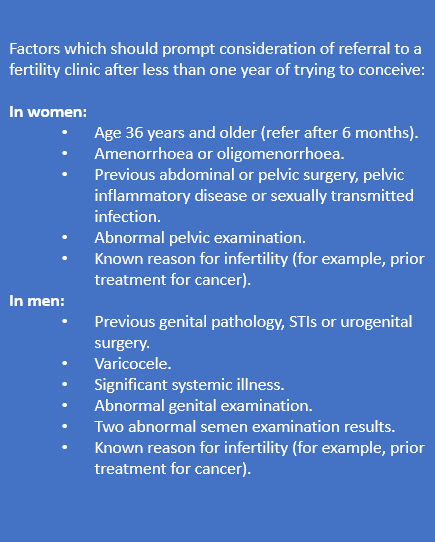Women's health toolkit
This Women’s health toolkit is categorised into sections best representing the needs of women at different stages of their lives.
Fertility
Infertility is defined by the WHO as failure to achieve a pregnancy after ≥ 12 months of regular (every 2-3 days) unprotected intercourse. 80% of couples in which the woman is aged under 40 will conceive in this timeframe and about half of those who don’t will conceive naturally in the next year.
Infertility can be caused by a variety of factors – the most recent figures for the UK are male factor (30%), ovulatory disorder (25%), tubal damage (20%), uterine or peritoneal disorders (20%) and unexplained (25%) – around 40% of couples have both a male and a female contributory factor and there may be more than one female factor.
Useful advice in primary care would include the avoidance of smoking for both men and women who want to conceive, that women should take folic acid, that an alcohol intake of >14 units/week may damage semen quality and that a body mass index over 30 kg/m2 is likely to reduce fertility in both sexes, as will a body mass index of < 19 kg/m2 in a woman.
 Our
main input into the management of infertility is to recognise it and refer
appropriately, after initial investigations in primary care. NICE advises that
investigation and referral should generally start at one year. Women who are
aged ≥ 36 should be referred after six months, and those who have other factors
which might indicate a cause for subfertility (listed in the box on this page)
should also be considered for earlier referral.
Our
main input into the management of infertility is to recognise it and refer
appropriately, after initial investigations in primary care. NICE advises that
investigation and referral should generally start at one year. Women who are
aged ≥ 36 should be referred after six months, and those who have other factors
which might indicate a cause for subfertility (listed in the box on this page)
should also be considered for earlier referral.
Eligibility criteria for fertility treatment will vary by area and may include consideration of age, BMI, smoking status and existing children in the current relationship or with previous partners. A list of investigations is also usually expected at the time of referral – these may include FBC, rubella immunity, tests for hepatitis B/C and HIV, a basic hormone screen, chlamydia test, pelvic ultrasound and semen analysis.
More information can be found in the following resources: